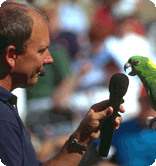Pooping on Cue

My Question:
I have an 18 yr. old male triton cockatoo whom I’ve had for 16 yrs. He is
my only bird and lives in our home in his very big cage. I keep his flight
feathers trimmed. He is healthy and well socialized with humans in the
family and community. I would love to train him to walk back to his cage to
poop when he is free roaming around the house with me or other family
members. He won’t go on furniture but does have favorite spots on the
floor and even sometimes on a rug. Please give me some guidance. Not having to clean up after him in this way would free up alot of my energy and who
knows what would emerge?
Thanks Cathy

Hello Cathy,
I believe the best place to start is to simply catch the bird in the act of pooping while on top of its cage. If you see him poop, reinforce the behavior by giving the bird a treat, or something else he likes, such as a scratch on the head, verbal praise and attention, etc. If the bird likes being with you, you might even pick him up just after he poops to reinforce the pooping behavior.
If you are really attentive to your bird's body language and learn his rate of pooping, or how often he generally poops in a given amount of time, you can anticipate when he feels the urge to go and put him back on the cage then wait for him to go. You might find that you will put him back on his cage every 15 minutes or so. You might also pick him up and put him on the cage when you see him going to one of his current favorite “pooping places.” If you wait long enough while he is on the cage, he will eventually poop and you can pick him up, praise him, give him a treat, etc., to reinforce the behavior. At this time you can also start putting in a cue for him to poop. All you have to do is say the word "poop," or whatever word you want him to associate with the action. It really doesn't matter what word or sentence you use as a cue, and you can even use a hand gesture or other visual cue. In the beginning you should say the word when you see him beginning to shows signs that he is about to defecate. Gradually you should start saying the cue word before he shows the signs so he can learn to understand the cue is a signal for a specific behavior that you want him to perform. Once he has learned the pooping behavior on cue, you should be able to cue the behavior in other areas, such as when you hold him over a trashcan or when he is sitting on a perch away from his cage.
Remember, behavior is strongly influenced by its consequences. So, whatever happens immediately after a behavior will help determine whether or not the behavior will occur again. The more you reinforce the pooping behavior with experiences the bird likes, the more likely it is that the bird will do the behavior again. Another important point to remember is to ignore unwanted behavior. If he makes a mistake and poops somewhere other than at his cage, just ignore it. The best training involves using positive reinforcement to train behaviors, and avoiding aversives, or things that the bird dislikes, to try and decrease the occurrence of a behavior. This is actually called punishment, and is usually a poor way to train animals. When you arrange the environment and set the bird up to succeed, and focus on positive reinforcement while avoiding negative interactions, I suspect you will be amazed at what your bird can learn.
Best of luck with the "poop training."
Steve

































